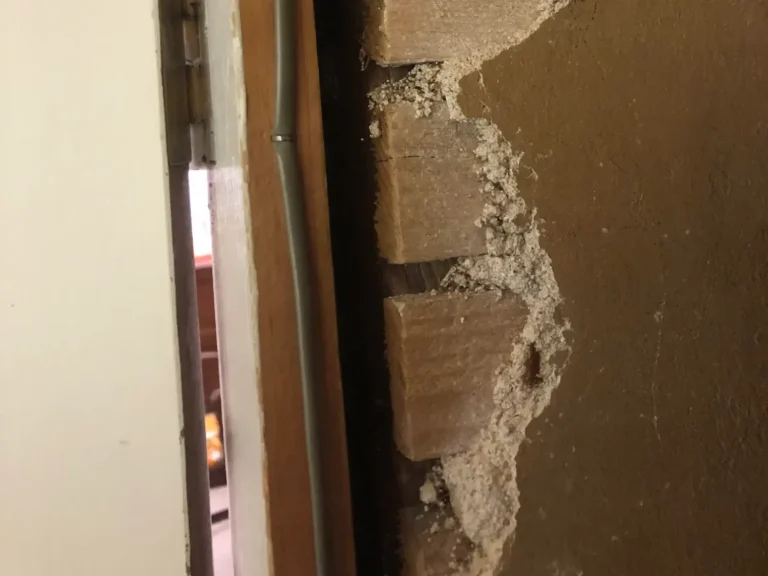Asbestos Testing Pros
A fully licensed and insured asbestos testing service committed to protecting homeowners and businesses across Eastern Massachusetts. Our expert team performs precise, efficient testing with minimal disruption, delivering fast, reliable lab results within 48 hours. We empower clients with clear, actionable insights to manage asbestos safely and maintain a healthy environment.
Test For Asbestos, Before It's A 'MESS' tos
Asbestos is a material commonly found in products used for constructing homes and businesses. It poses a significant danger when it becomes airborne dust (friable), inhalation can occur. Factors such as demolition, building settlement, and other environmental influences can cause previously non-friable asbestos fibers to loosen and become a hazard.

Breaking Plaster
Disturbing or breaking asbestos-containing plaster can release microscopic fibers into the air, posing serious health risks if inhaled. If you notice damaged or deteriorating plaster in your home, do not disturb it. Contact a licensed professional for testing and safe management to minimize health hazards.

Popcorn & Textured Ceilings
Asbestos was frequently used in textured and popcorn ceilings, especially in homes built before the 1980s, due to its fire-resistant properties. Disturbing these ceilings through scraping, sanding, or renovations can release harmful asbestos fibers into the air. If you have textured or popcorn ceiling, avoid disturbing it and hire a certified professional for testing to prevent exposure risks.

Vinyl & Linoleum Flooring
Vinyl and linoleum flooring, including their backing and adhesive, can contain asbestos, posing health risks if disturbed. In older homes, hidden layers of flooring may only be discovered during demolition. To avoid safety hazards and project delays, ensure all layers are tested for asbestos beforehand. If suspected asbestos is found during a project, halt demolition immediately and consult a certified professional for testing.

VCT Tiles
Vinyl Composition Tiles (VCT), often found in basements or beneath layers of flooring in homes built before the 1980s, frequently contain asbestos. Typically sized 9 x 9 inches or 12 x 12 inches, these tiles pose a risk when disturbed. Cutting, sanding, or breaking VCT can release harmful asbestos fibers into the air, creating serious health hazards. If you suspect VCT in your home, avoid disturbing it and contact a certified professional for testing to ensure safety and minimize risks.

Siding & Roofing
From the early 1900s to the 1980s, asbestos was commonly used in roofing materials and siding for its durability, fire resistance, and insulating properties. Products such as asphalt shingles, cement sheets, and siding tiles frequently contained asbestos. Although banned in many countries by the late 20th century, older buildings may still harbor these materials. Professional testing and careful handling are essential during renovations or removals to prevent health risks from asbestos exposure.

Ceiling Tiles
From the 1950s to the 1980s, asbestos was widely used in ceiling tiles for its fire resistance, durability, and soundproofing properties. Common in acoustic and decorative tiles, these were popular in both commercial and residential buildings, typically measuring 12 x 12 inches with textured or perforated designs. Although regulations in the late 20th century curtailed its use, older structures may still contain these tiles. Careful identification and professional management are essential during renovations or demolitions to prevent health risks.

Permits
In Massachusetts, asbestos testing is required for permitting in any town or city where renovation or demolition projects involve buildings constructed before the 1980s, as these may contain asbestos. The Massachusetts Department of Environmental Protection (MassDEP) mandates that owners or operators conduct a thorough asbestos inspection prior to such activities in residential, commercial, or institutional buildings to identify asbestos-containing materials (ACMs) like insulation, floor tiles, or roofing. Notifications must be filed with MassDEP and the Department of Labor Standards (DLS) at least 10 working days before starting work, and local boards of health, building inspectors, or fire departments may also require approvals

AHERA - Schools
In Massachusetts, an AHERA inspection is a mandated assessment under the Asbestos Hazard Emergency Response Act (AHERA, 40 CFR Part 763) to identify asbestos-containing materials (ACM) in public and private K-12 school buildings. Conducted by EPA-accredited inspectors, it involves a thorough examination of building materials
